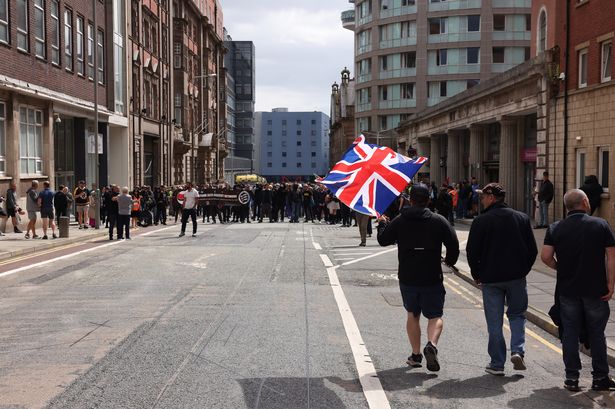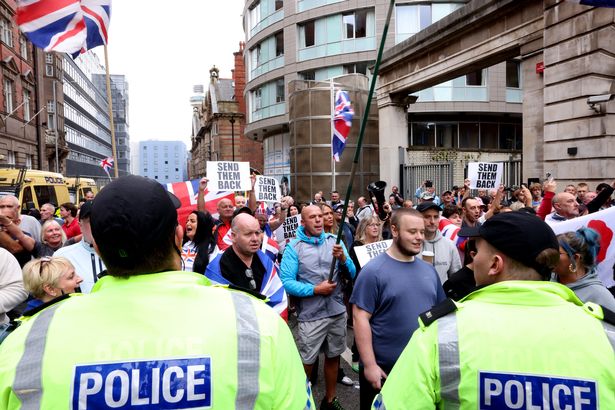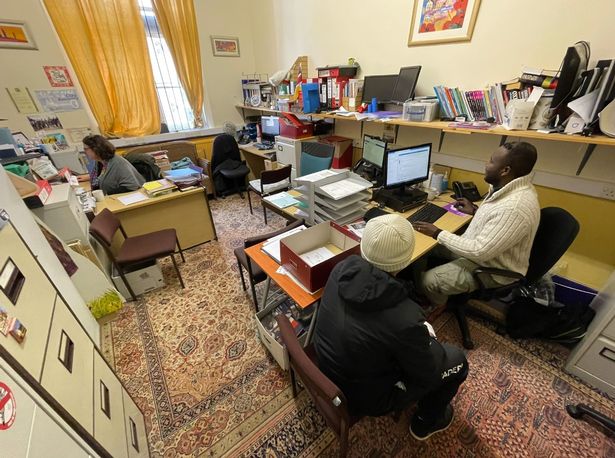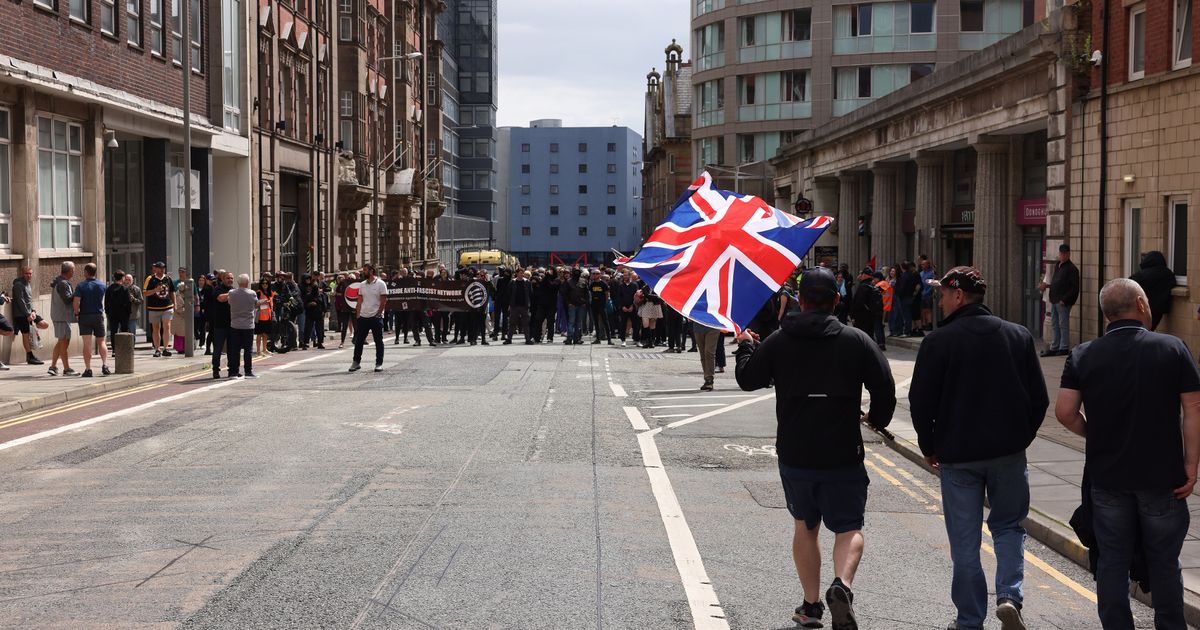Special report: Amid protests and rising aggression towards asylum seekers across the country, we spoke to those being targeted Anti-migrant protesters face off against a counter protest on Hatton Garden in Liverpool in August(Image: Liverpool Echo)
Anti-migrant protesters face off against a counter protest on Hatton Garden in Liverpool in August(Image: Liverpool Echo)
On a warm Monday afternoon, in a quiet back alley in Liverpool city centre, a young man is wandering aimlessly, smoking a cigarette.
Dressed in a black vest top, black shorts and flip flops and sporting a backwards cap, he manages to somehow look both relatively relaxed and a little edgy at the same time – taking a few puffs while glancing warily from side to side. This is Ali, he is 19 and he has had one hell of a journey to get here.
“I am from Tanzania, but it was too dangerous to stay there, I had to get out,” explains Ali, who is an asylum seeker.
He says he was facing persecution on both religious and political grounds in his native country, adding: “If I stayed there I would end up in jail for 30 years, so I had to go.”
This very young man then embarked on the kind of nightmarish journey that most of us could not even begin to contemplate. He paid people smugglers to stow him away on a large ship in order to cross the Mediterranean Sea to France, where he says he faced constant peril.
“It is very dangerous in France, there are gangs with guns who target refugees. I was living in a tent in a forest, it was not safe,” he adds with a distant expression.
Desperate to get out of France, Ali crossed the channel in a small boat to the UK, eventually ending up in Liverpool, as many asylum seekers do, as the city has a Home Office immigration reporting centre.
“I came on a small boat to the UK because I needed a place where my life would be safe,” explains Ali, his face carrying too much visible strain for someone so young. “Some people have worries about money or jobs, I just needed to stay alive.”
He adds: “If I can stay in the UK, I think my life is safe. I don’t have any money, I would love to go to college and educate myself. I really enjoy learning.”
But like many who have made the desperate journey to seek sanctuary in this country, Ali feels things are now becoming less safe here after a summer dominated by anti-immigrant sentiment.
“One day I was having a cigarette in the street and this guy was recording me,” he recalls. “He was very drunk, he kept shouting at me, saying ‘motherf*****, you came here illegally.
“I understand some people don’t like refugees, that is just life,” he adds with a sigh.
For the past three months Ali has been living alongside his fellow asylum seekers in hotel in Liverpool city centre. With tensions over immigration in the country rising to boiling point this summer, those living in the venue have found themselves targeted on multiple occasions.
On August 9, protestors gathered outside the building draped in Union and St George’s flags. Some held placards aloft with the words “send them back” printed across them, chanting angrily at those inside. It wasn’t the first time the hotel had been targeted.
 Anti-migrant protesters face off against a counter protest on Hatton Garden in Liverpool(Image: Liverpool Echo)
Anti-migrant protesters face off against a counter protest on Hatton Garden in Liverpool(Image: Liverpool Echo)
Another resident of the same hotel, a 28-year-old man from Africa, spoke to the ECHO about what it is like inside when protestors gather outside.
“I think there have been three protests here now,” he says. “It changes everything for us, it means we can’t go outside for a long time because it is not safe. You can lose your mind when you have to stay in your room.”
Describing one of the recent protests, he adds: “If you open your window they are trying to film you and shout at you. Some of them were throwing things at us.
“One guy managed to get into the hotel and was filming. He was knocking on the doors.”
Dressed in a black jumper, jeans and flip flops, the man is understandably edgy while stood outside the hotel. He doesn’t want to give his name or the specific country that he comes from, but like Ali, it was one he had to leave.
“I was in danger, it was not safe,” he explains. “I am in danger there with the current government. People close to me started disappearing. I needed to get out.
“I know I am a target. My sister fled to a different country,” he adds.
His journey was different, he says he actually came on a rare safe route by plane but has been struggling to be granted refugee status for some time and has spent the last four months holed up in the hotel.
Speaking about those protesting against him and others, he is philosophical: “I am not sure if these people are racist, I think they are maybe just misinformed. I am not sure it is about racism, I think it is about character.”
But he admits to feeling less safe now as tensions rise across the UK, adding: “I am scared. There are passers-by shouting at me, people driving past, honking horns and shouting at me. It is scary.”
He is frustrated by myths being parroted about the supposed cushy lives of asylum seekers once they arrive in the UK. “If you get money to live on it is £9 per week. We are not allowed to work, I don’t have a phone.
“All I want to do is study and finish my engineering degree. Every day I go to the library to study. I would never want to just live on benefits, that is the wrong thing to do.”
Despite the increasing anger he is now facing, he remains convinced the UK is the best and safest place for him – and he has experienced kindness here in Liverpool.
“I have met some very good people in the UK,” he adds. “Liverpool is the best place. It is beautiful and people are very outgoing here.”
The rising tide of anti-immigrant feeling is also being felt sharply at the Merseyside Refugee Support Network. A small charity based in Toxteth that helps those who have fled persecution, war and trauma with their status claims.
On a Tuesday morning there is a steady stream of people coming in and out of a busy little office where charity manager Seána Roberts and her small team of staff and volunteers are working to assist people – many of whom have been through hell.
In the corner of the room sits a family. The dad is from Eritrea, the mum from Ethiopia and their 12-year-old daughter. The couple both fled ongoing conflicts in their own countries and met in Sudan, but had to leave after a vicious and bloody civil war erupted in 2023.
Speaking through a translator, the father, Mustafa, explains that he has refugee status but his wife and child do not, this is what they have come to the charity for help with – they are desperate to stay together.
Asked for their feelings about the current wave of protests and the growing sense of hostility towards immigrants in the country, Mustafa says: “We feel like in our country we have a big problem. Now people are feeling that there is a problem for them in this country as well. It feels unsafe for us.
“We came to the UK because we believe there are good people here. This is not the British people we know.”
While many will point to politicians like Nigel Farage and his right-wing Reform UK Party for stoking animosity towards those seeking a safer life on these shores, there is no doubt that the increasingly hard-lined policies of the current Labour government are directly now making things more difficult for people by the day.
The man helping the family with their status is Alhussein Ahmed, a refugee from Sudan who has lived in the UK for 15 years. He is a key figure at the Merseyside Refugee Support Network and supports many who need help. But he now faces his own existential challenge.
Last week the now former Home Secretary Yvette Cooper made the shock decision to halt a scheme which allows refugees to bring their families to the UK. Ms Cooper said the family reunion route was at risk of being exploited and has temporarily suspended new applications until tougher rules are brought in next year.
Those who have had their asylum claims accepted will now have to apply though the standard family scheme, which applies to UK citizens who can show they have a joint income of at least £29,000 per year before they can bring their family to the UK.
For Alhuseein, this was a hammer blow. His wife and two young children are currently in Egypt and he has been working for years to try and bring them to be with him. He will not quality for the family scheme.
““That has a very negative effect for me,” he explains with a resigned expression. “If I cannot get my children here, I am not British, that means I will have to go. I have been here for 15 years and I cannot bring my children.”
 Seána Roberts (left) and Alhussein Ahmed working at the Merseyside Refugee Support Network(Image: Liverpool Echo)
Seána Roberts (left) and Alhussein Ahmed working at the Merseyside Refugee Support Network(Image: Liverpool Echo)
On the protests and anger in the UK, he adds: “It makes me very worried. This isn’t the Britain we know. We should all be living in peace and harmony and helping one another – instead of this divided community.”
The current direction of the government – as well as what appears to be happening in the country, is infuriating and depressing charity manager Seána Roberts, who has worked in the refugee sector for 25 years.
“I feel so depressed,” she says, holding her head in one hand as she sits in front of piles of papers and boxes stuffed with forms. “I am scared myself right now, so how must it feel for the people living in these hotels? Not knowing their future, waiting for decisions while all this is going on.
Seána and her charity have already faced grave threats for their work. Last year the building they work out of had to be boarded up as as far-right groups pledged to target it with petrol bombs amid nationwide unrest following the murders of three girls in Southport. She feels that if anything, the situation across the country has got worse since then.
“I just feel like we’re doomed,” she adds: “It just feels awful that people feel they can be openly racist and throw insults around and speak about people as thought they are animals. I don’t understand what has happened to our society.
“People are allowed their opinions of course, but when that is a misinformed opinion, fed through social media or lies from politicians and alternative media, you just think, at what point will people wake up and realise they are being fed lies?”
“There is this vile assumption that if people have come to this country as single people then they are going to cause no end of violence. I hate this ‘fighting age’ line they say, it is so loaded. It is well documented that it is often younger men who will attempt these dangerous journeys and will then try and bring their families over later.”
Reacting to the Home Secretary’s announcement last week, she adds: “Well there is no less war, torture or persecution in those parts of the world that these people are coming from. So that means that the whole family – including women and children – are all going to take those perilous journeys.
“What we need is a humanitarian response to that, rather than trying to win Reform votes. I think it is disgusting and disgraceful that this government has done so much to pander to right wing politics rather than thinking about the humanitarian approach.”
“What is it about society now that means we think it is ok to be horrible, inhumane and racist to people?” asks Seána. “The vast majority of people we see have come from civil war, have faced persecution from political regimes or from places where they are scared, traumatised or victims of violence.
“There is no doubt that these people are fleeing something horrific. These people are mums, dads, brothers and sisters. They are teachers, architects, radiologists and dentists. They are people just like you and me.”
